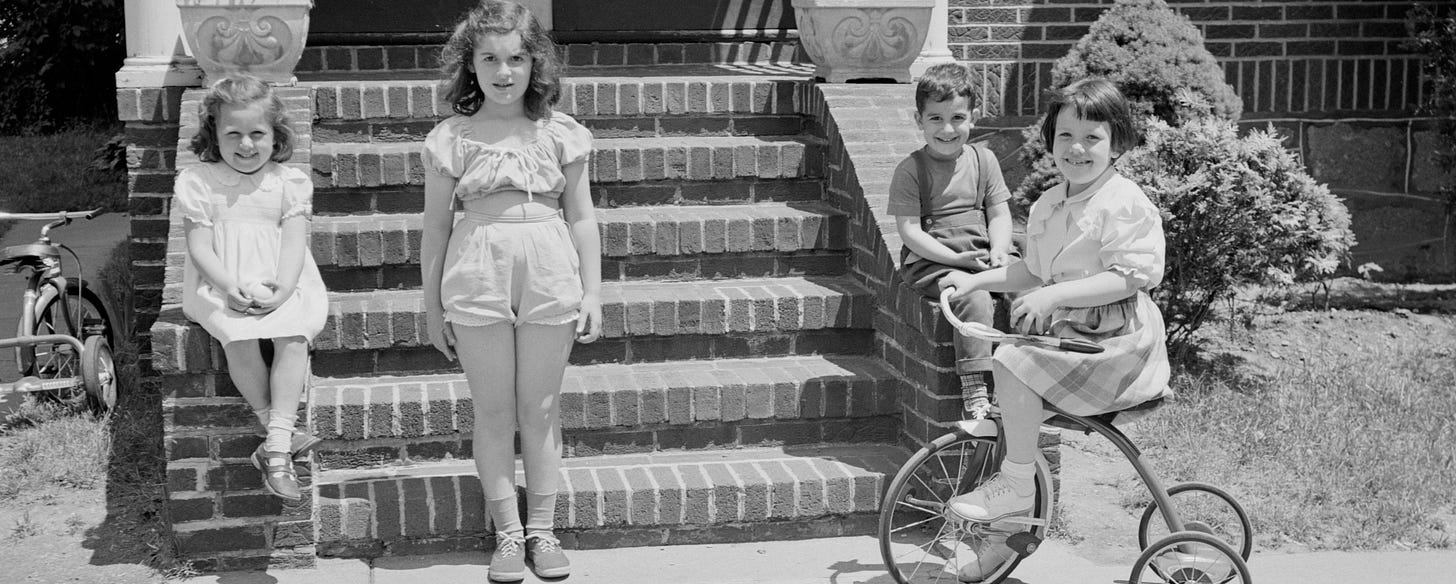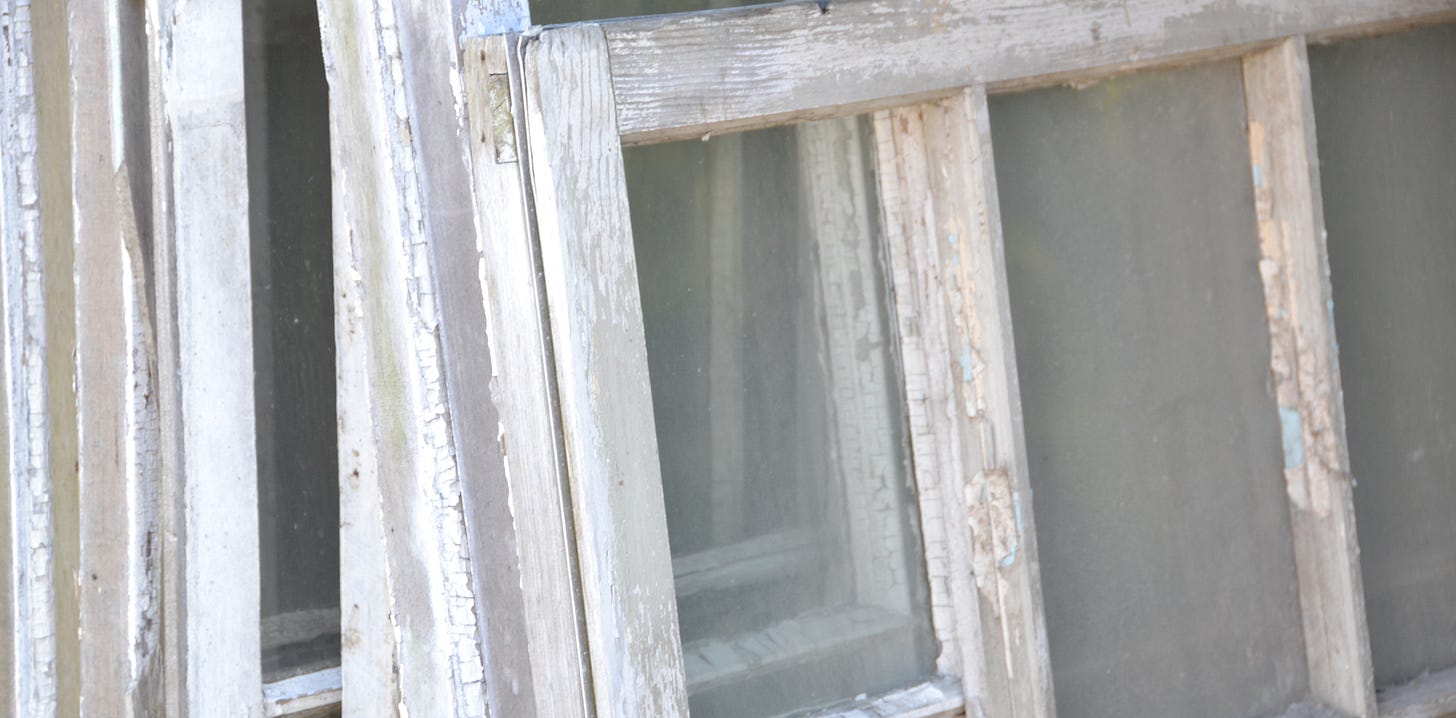Primal shadow
... tumbling into the chasm of silence
This is the second in a series of who-knows-how-many pieces on Life beyond the Shadows, living through the truths I find buried as I go traipsing around in my personal story. My hope is that the ones I find might prove helpful should you choose to pull on boots and head out to muck around in the land of your own storied truths.
It was dinnertime and the five of us - mom (pregnant with my brother) and dad, and my older and younger sisters - were seated at the kitchen table. I don’t think this was the table with the missing leg, the one that had to be propped up on the hot water radiator; I seem to recall my dad sitting at the end of the table and, of course, he couldn’t have been if the table was propped on the rad. But memories are fickle things. We shift and distort them over time, layering them with subsequent knowledge gleaned through other experiences, the stories others tell us, our own desire or need to find a different tale. Other than the vague placement of my father, however, the rest of it is true. At least, as true as a barely-five-year-old could remember it.

I would be starting school in the fall. My sister, seventeen months older than I, had already been and I was so terribly jealous of her. She got to leave the house, walk up the street in a smocked dress (the same one each daughter would subsequently wear on her first day of school) and suddenly be all grown up.
So this story is likely embedded in the maybe-a-tad-stronger-than-a-whisp of jealousy I’ve confessed having for my big sister, heading out into the world on her own as she did each morning. Once, upon her return, I made up a lie and told her one of our mom’s friends - our very, very, very favourite Mrs. Jackson - had visited that afternoon. Seriously. How stupid was that? In an instant, the one that came right after my smug delight in seeing her disappointment, she learned it wasn’t true. I don’t remember being punished, but the humiliation!! The humiliation was terrible!! I don’t think I’ve ever been able to lie since. I might not tell you everything, but if you ask … well, you’d best be prepared for the truth. There is simply soooooo much stress with lies.
Getting attention at our busy dinner table, what with my sister telling all her stories about Kindergarten and Mrs. Robinson (I’m exaggerating here), was a challenge. One day, wanting to impress, I shared with the family a little victory of my own. Out on my tricycle that day, I’d been able to sound out the word on the sign at the corner and was terribly excited and eager to boast. I didn’t even have to go to school to know how to read! So I broke into the conversation and boldly sought everyone’s attention: “I know what it says on the sign at the corner.”

There were only two signs on our whole block, both of them stop signs. One was on the corner that butted onto our neighbour’s house, a short peddle down the block: ride your trike down the street, turn around, look up, and there it was. The other was on the side of the block we reached through our backyard; there’s no sidewalk to run your tricycle down on that side. In other words, there was only one sign to which I could possibly be referring, so everyone turned toward me with happy (my parents) or curious (my sisters) anticipation and waited. (You’re going to have to scroll to savour this moment of triumph.)
.
.
.
.
.
.
.
.
.
.
.
.
.
.
.
.
With everyone’s attention turned toward me, I smiled broadly and said,
Scroll some more
.
.
.
.
.
.
.
.
.
.
.
.
.
.
.
“FUCK”
Silence
… and then everything exploded.
Or, I should say, my father did. My memory is sheer terror. Erupting from his chair, he lunged toward me. I tried to get away. My mom jumped up to put herself between us. I had no idea what I’d done or how this brilliant triumph had turned into the worst moment of my life so far.
The word, of course, had been spray-painted on the back of the stop sign. I mean, really. Any self-respecting three-year-old knows what a stop sign says (don’t they?); why would I have tried to impress my parents with that? Years later I memorized George Carlin’s “Shit, Fuck, Piss, ….” list just to irk my mother, but when I first proudly uttered the “F” word, I didn’t even know swearing was a thing. And before I did, I learned it was a bad thing. A very bad thing. I just didn’t know why.
Each day, after reading an entry from Ryan Holiday’s The Daily Stoic, I write close to a page of reflections on what that particular entry brings to mind. The day I read Epictetus refer to your being kidnapped by your own impressions when you are not prepared, I wrote twice that, the only time I’ve done so.
The trauma of the kitchen table episode ingrained in me a fear of sharing events with my parents if I was uncertain about how they would be received. From my notebook,
I was unable to process [traumatic events], vulnerable to every single wave that crashed on my shore. A simple, single event stripped me of the protection of my parents - quite unintentionally - and left me so so so vulnerable long before I had the skills to process anything else that happened to me. It left me completely and absolutely alone and perhaps on high alert - always ready to protect myself from what might come and always being just as unprotected when it did.
So my memories after that event are few. Very few. When I was fifteen, a friend burst out laughing remembering one of those wild and crazy teenage things that had happened to us the previous summer. I had absolutely no recollection of it at all. And any memories I do have are predominantly in the third person, vague images of me somewhere or with someone, in a garden we’ve visited or on a road trip enjoyed. They swim around as gentle reminders of happy times while traumatic events are tattoo-inked onto my retinas, every word spoken, every detail lived, ready to rush through my brain at any instant. Perhaps I can never be fully present to what is happening around me, half of me unwaveringly attentive to what might go wrong and planning my escape. The other half an aggregate of everything that ever did go wrong or felt wrong or maybe couldn’t possibly have happened at all.
Holiday refers to Epictetus’ use of the storm as a metaphor for our impressions of what is happening around us. He notes, however, that we’re not as vulnerable as were the ancient Greeks; we have weather forecasts that keep us informed about what’s coming noting that we’re “defenceless against a hurricane only if we refuse to prepare or heed the warnings.” He goes on, “If we don’t have a plan, if we never learned how to put up the storm windows, we will be at the mercy of these external - and internal - elements.”
I wrote:
Storm windows. I had no storm windows. Without storm windows, there is no protection from the storm that is life. If you are a child when you learn that, you have to devise some way of protecting yourself and it isn’t just not telling. Because not telling isn’t protection. It comes after an event. You become overly vigilant in every situation but need to do that before you have any way of knowing how to do that. So your brain does it for you: it is on high alert - subconsciously - but just enough to keep you from creating memories in real time. Is that possible? Is that why I only remember negative things? Or am I making that up because I’m trying to understand. I was a little kid without a safe place to run for solace and love if I was hurt. So I didn’t tell anyone anything bad that happened. And I don’t remember anything else.
A year later, when the sedan I remember to be a metallic bluish-silver pulled up beside me, a block from my home, and the driver, a deep, distinctive cleft in his five-o’clock-shadowed chin, pulled out his penis, rubbing it as he smiled at me, I told no one.
The first of a long string of not-tellings.






I love the analogy to storm windows! I so needed them growing up.
Your prose is poetry, Gretta. Just wanted you to know I was reading.